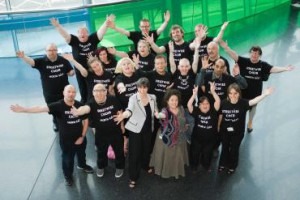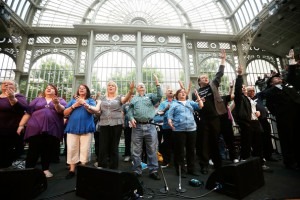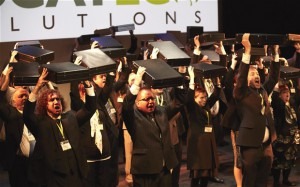
Credit: http://images.streetwiseopera.org/
In the first of a new series of features on musical organisations that make music with non-musicians, I spoke to the founder of Streetwise Opera, Matt Peacock, and began by asking him about the organisation’s beginnings.
‘In the 1990s I was working as an opera journalist’ he said, ‘and became interested in homelessness and the different ideas people have about the best ways of dealing with the problem. I volunteered an evening a week for The Passage night shelter in London, and after a while became a part-time support worker. Then, in about 2000, an article was published about a politician who said that the homeless are ‘the people you step over coming out of the Royal Opera House’, and we decided that it was a real opportunity; to put on an opera with homeless people would challenge and change the public perception of homeless people, and turn that stigma into a celebration of what homeless people could achieve.’

Credit: http://www3.pictures.zimbio.com/
Peacock talks with great passion and purpose, but unlike many discussing the homelessness issue (including many politicians), he is calm and practical, without resorting to hyperbole or patronisation. I asked him whether the work of Streetwise Opera has changed in its 13 years so far.
‘Well, we’ve grown from that first project in London,’ he said, ‘and now we run weekly programmes in ten different centres across England and Wales. We also have a growing international programme, with work in Japan, American and in Australia, and are looking at the possibility of projects in Brazil as well. What also happened in that time is that the arts have become much more respected and valued as a tool for social change. It’s still difficult to measure effectively, because sometimes it’s quite intangible as to what the arts actually do to people. But it can clearly make people grow, can make them feel very differently about themselves – and that can lead on to a variety of impacts.’

Credit: http://i.telegraph.co.uk/
We ended by discussing the future for Streetwise Opera, both in the next few years and more long-term. ‘We have a number of exciting projects for the next few years being announced in September’, said Peacock. ‘But more widely, our vision is for a world where the arts play a fundamental and well-understood role in supporting homeless people. We also hope that all these initiatives with the arts are being used to help symptoms and causes in social and medical welfare, such as in medicine or the criminal justice system, becomes a fundamental part of the way that we support each other.’
In a musical climate where seemingly every orchestra, ensemble or opera house is almost obliged by funding bodies to sustain an education programme, it is sometimes difficult to look beyond box-ticking to assess the true impact of that work. Streetwise Opera surely places beyond reasonable doubt the very real effect of that reaching out to all members of one’s community, and the power of the arts to create genuine positive change in our world.
Streetwise Opera’s 2014-16 season features The River Keeper, a new opera from award-winning folk band Bridie Jackson and The Arbour, new work from composers John Barber and Streetwise Opera Composer-in-Residence Stef Connor, and collaborations with The Sixteen and composer James Macmillan.
Official Website
Streetwise Opera featured on BBC Culture Show 2005




